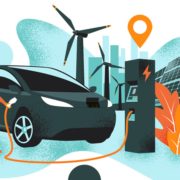Republicans absent, President Biden’s Climate Plan languishes; held hostage by a one coal state democrat
Meanwhile, hundreds of billions in private investment in a clean energy economy are mostly on hold awaiting Federal action.
Hundreds of billions in private investment in a clean energy economy are mostly on hold awaiting Federal action and Democratic lawmakers to enact clean energy tax credits proposed as part of the President Biden’s Build Back Better bill. According some economists the bill’s tax credit provisions pushes the economics of many projects over the hump.
The proposed bill, backed by President Biden, would pump about $550 billion into the clean energy and climate business, according to the Joint Committee on Taxation, about $311 billion of it in the form of tax credits and incentives.
“Investors are waiting in the wings to deploy capital for clean energy, with this industry poised to be the major engine of 21st-century prosperity,” said Leah Stokes, an associate professor of political science at the University of California at Santa Barbara. “Without these government incentives, that capital won’t get deployed. With them, we are poised to have a prosperous clean energy economy.”
Industry groups, as well as climate activists, have been frustrated by the delays. More than 260 clean energy companies wrote to congressional leaders in January saying that each month of delay to the Build Back Better (BBB) tax incentives costs the U.S. economy as much as $2 billion in economic activity.
The letter cited an analysis by the American Clean Power Association that found the legislation would more than double clean energy investment to $750 billion over the next 10 years creating hundreds of thousands of new and good paying American jobs, while advancing America’s transition to a clean energy economy.
The same analysis projected that the credits would cut carbon emissions from the U.S. power sector by roughly 70 percent below 2005 levels — the equivalent of powering 175 million American homes with reliable and climate resilient clean energy.
Are EV’s in Trouble if BBB fails?
 The President Biden’s BBB bill calls for expanding tax credits for Electric Vehicle purchases to as much as $12,500 (legacy Federal and state EV tax credits, some still in effect, offer significantly less financially benefits to BEV buyers on select qualifying models). In the meantime, Detroit and other automakers are (or preparing to) invest billions into new plants to produce EVs. Without Federal EV purchase credits, middle and lower income buyers will have difficult with current electric vehicle price tags, slowing the transition to zero emissions, this is especially true for many of Hawaii’s residents.
The President Biden’s BBB bill calls for expanding tax credits for Electric Vehicle purchases to as much as $12,500 (legacy Federal and state EV tax credits, some still in effect, offer significantly less financially benefits to BEV buyers on select qualifying models). In the meantime, Detroit and other automakers are (or preparing to) invest billions into new plants to produce EVs. Without Federal EV purchase credits, middle and lower income buyers will have difficult with current electric vehicle price tags, slowing the transition to zero emissions, this is especially true for many of Hawaii’s residents.BBB Passage, Democrats’ remain hopeful…




Leave a Reply
Join the Community discussion now - your email address will not be published, remains secure and confidential. Mahalo.